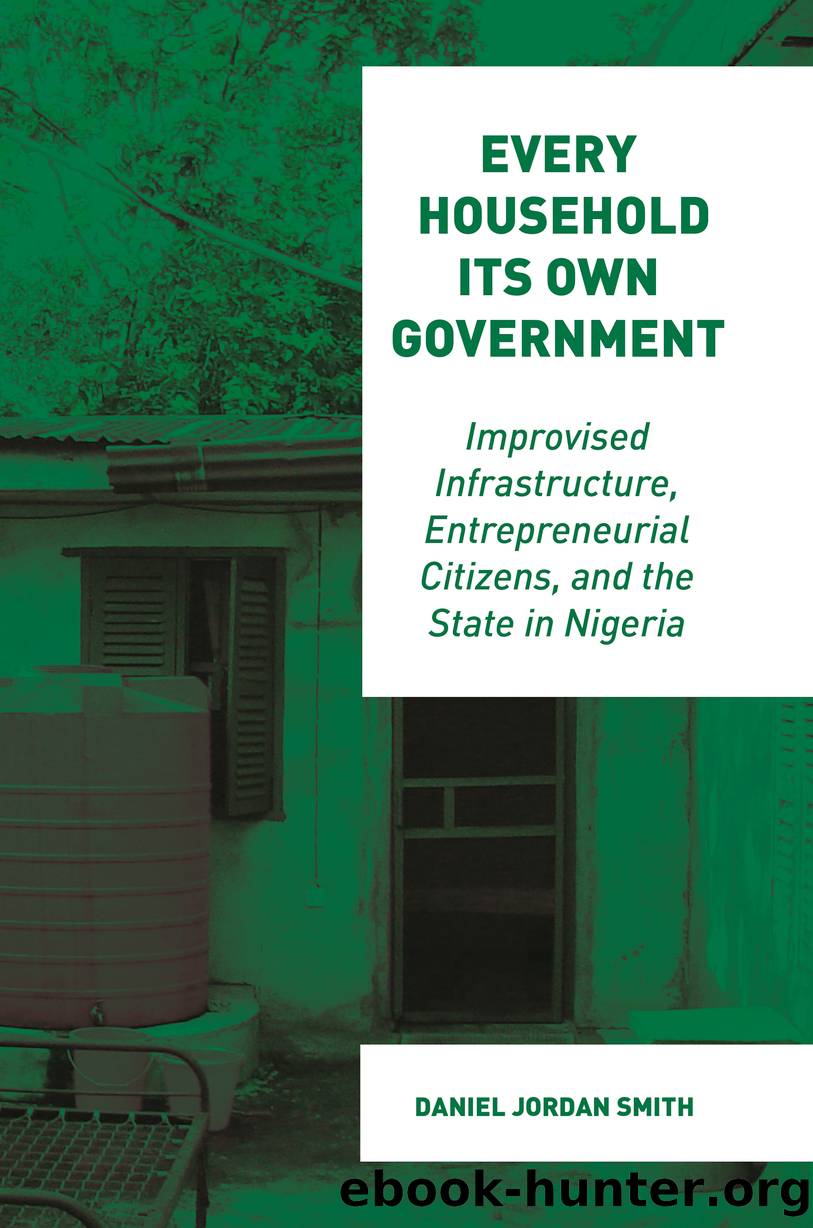Every Household Its Own Government by Daniel Jordan Smith;

Author:Daniel Jordan Smith;
Language: eng
Format: epub
Publisher: Princeton University Press
Published: 2021-12-15T00:00:00+00:00
âThe Fire That Consumes Moneyâ
In southeastern Nigeria, Igbo-speaking people dubbed cell phones oku na iri ego, which translates as âthe fire that consumes money.â This popular local name reflected ordinary citizensâ frustrations with the perceived exorbitant costs of cell phone calls. New linguistic turns of phrase and innovative social practices that evolved with the proliferation of mobile technology built on peopleâs aggravation over the strain of cell phone ownership, but they also indicated the degree to which cell phone culture had taken root in everyday life.
Nigerians quickly adapted their cell phone usage to suit their economic circumstances, and some aspects of the service plans offered by the countryâs main providers were clearly designed to attract and retain customers who could not afford to make a high volume of phone calls. For example, the Short Messaging Service (SMS) was extremely popular in Nigeria early on and by 2005 typically cost only 15 naira (about $0.10) per message. Text messaging was particularly popular with younger customers, and it generated its own lexicon of abbreviations, an economy of language that also became part of Nigeriaâs youth culture, as it has in other settings.3
Text messaging became a common way for Nigerians who could not afford regular phone calls to communicate using the new technology. But for older people, and even among young folks, using text messages too frequently without also calling could be interpreted as a sign of reluctance to spend money on a particular social connectionâreflecting either stinginess or a lack of deep concern, or both. As a consequence, although text messaging was (and still is, to a considerable extent) extremely popular, people were careful not to rely on it too exclusively, lest they become objects of criticism. In times of economic hardship, the willingness to spend money on a phone call was evidence of interest or commitment to a relationship, whether it was a friendship, a family tie, a business partnership, or a romance (cf. Archambault 2013, 2017 for Mozambique). The previously mentioned âNFAâ critique of men who utilized MTNâs night-calling discount was but one instance of how calling behavior was socially evaluated.
Download
This site does not store any files on its server. We only index and link to content provided by other sites. Please contact the content providers to delete copyright contents if any and email us, we'll remove relevant links or contents immediately.
| Central Africa | East Africa |
| North Africa | Southern Africa |
| West Africa | Algeria |
| Egypt | Ethiopia |
| Kenya | Nigeria |
| South Africa | Sudan |
| Zimbabwe |
Goodbye Paradise(3798)
Men at Arms by Terry Pratchett(2831)
Tobruk by Peter Fitzsimons(2504)
Borders by unknow(2301)
Arabs by Eugene Rogan(2292)
Pirate Alley by Terry McKnight(2217)
Belonging by Unknown(1854)
More Than Words (Sweet Lady Kisses) by Helen West(1851)
It's Our Turn to Eat by Michela Wrong(1720)
The Biafra Story by Frederick Forsyth(1648)
The Source by James A. Michener(1602)
Botswana--Culture Smart! by Michael Main(1597)
Coffee: From Bean to Barista by Robert W. Thurston(1534)
A Winter in Arabia by Freya Stark(1533)
Gandhi by Ramachandra Guha(1528)
The Falls by Unknown(1519)
Livingstone by Tim Jeal(1479)
The Shield and The Sword by Ernle Bradford(1399)
Africa: Altered States, Ordinary Miracles by Richard Dowden(1379)
